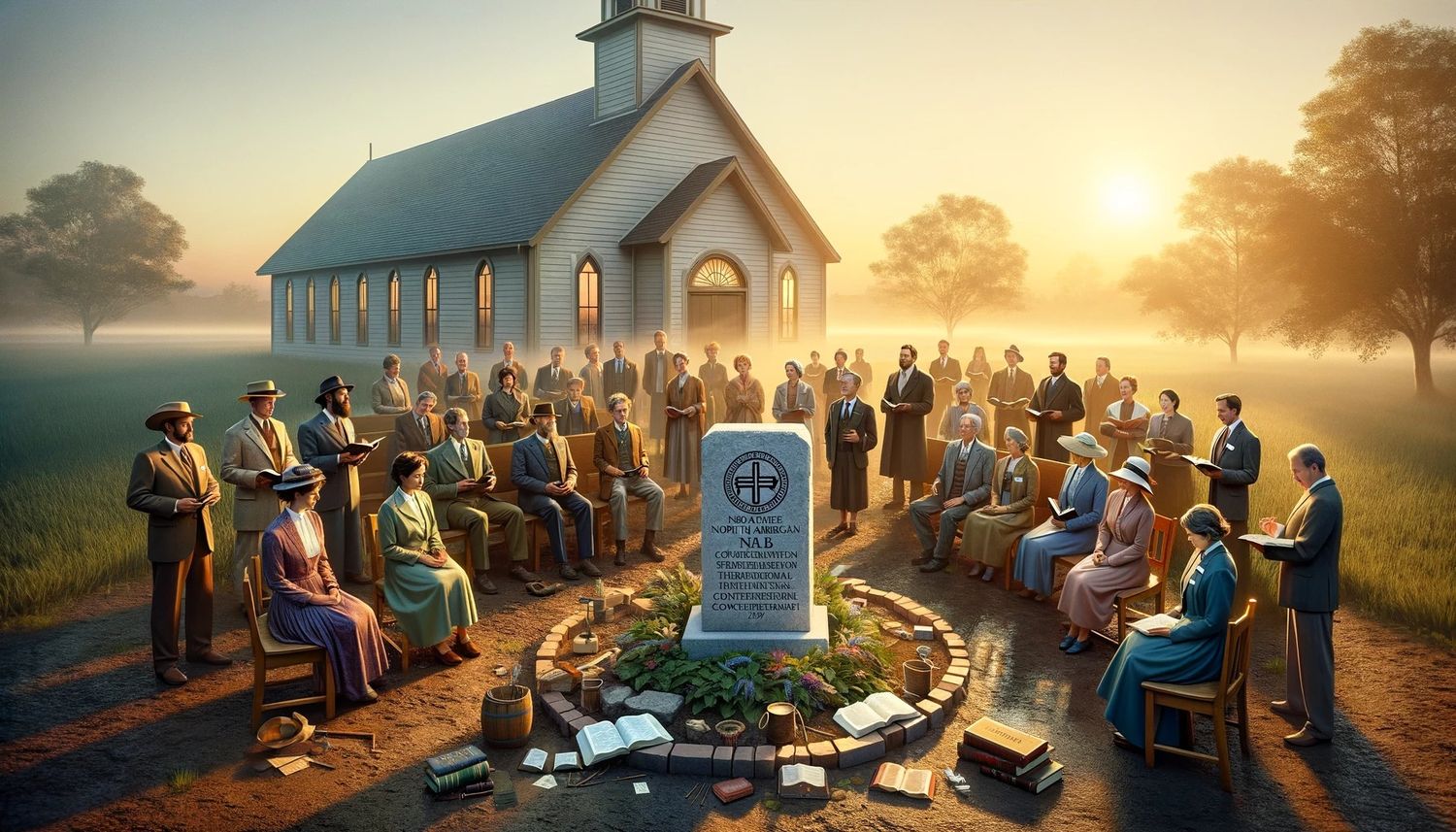Home>Theology and Spirituality>What Is A Confessional Lutheran Church


Theology and Spirituality
What Is A Confessional Lutheran Church
Published: March 3, 2024
Ericka Andersen, an editor at Christian.net, expertly merges digital strategy with content creation, focusing on faith and societal issues. Her communication skills enhance the platform's engaging narratives, fostering meaningful dialogue on belief's impact on society.
Discover the theology and spirituality of a Confessional Lutheran Church. Learn about its beliefs, practices, and traditions in this comprehensive guide.
(Many of the links in this article redirect to a specific reviewed product. Your purchase of these products through affiliate links helps to generate commission for Christian.net, at no extra cost. Learn more)
Table of Contents
The History of Confessional Lutheranism
Confessional Lutheranism has its roots in the Protestant Reformation of the 16th century. It traces back to the teachings of Martin Luther, a German monk and theologian who sought to reform the Roman Catholic Church. Luther's writings and teachings sparked a movement that led to the establishment of Lutheranism as a distinct Christian tradition. The term "confessional" in Confessional Lutheranism refers to the Lutheran Confessions, which are a collection of documents that articulate the beliefs and teachings of the Lutheran faith. These confessions serve as the foundation for the theological identity of Confessional Lutheran churches.
-
The Reformation Era: The Reformation, which began in the early 16th century, was a period of significant religious and theological upheaval in Europe. Martin Luther's posting of the 95 Theses in 1517 is often regarded as the starting point of the Reformation. Luther's emphasis on the authority of scripture and the doctrine of justification by faith alone challenged the teachings and practices of the Roman Catholic Church.
-
The Augsburg Confession: In 1530, a group of German princes and leaders of the Reformation presented the Augsburg Confession to the Holy Roman Emperor. This document outlined the key theological positions of the Lutheran movement and sought to demonstrate that these teachings were in harmony with the teachings of the Bible and the early Christian church.
-
The Book of Concord: The Book of Concord, published in 1580, is a compilation of the Lutheran Confessions, including the Augsburg Confession, the Apology of the Augsburg Confession, the Smalcald Articles, the Treatise on the Power and Primacy of the Pope, Luther's Small Catechism, and Luther's Large Catechism. These documents collectively form the confessional basis of Confessional Lutheranism.
-
The Lutheran Orthodoxy: Following the Reformation era, Lutheran theologians further developed and articulated the teachings of the Lutheran Confessions. This period, known as Lutheran Orthodoxy, saw the elaboration of Lutheran doctrine in response to theological controversies and challenges from other Christian traditions.
-
The Global Spread of Confessional Lutheranism: Confessional Lutheranism spread beyond Europe to other parts of the world through missionary efforts and immigration. Today, Confessional Lutheran churches can be found in various countries, each with its own distinct cultural expressions and theological emphases while remaining rooted in the confessional heritage of Lutheranism.
The history of Confessional Lutheranism is characterized by a commitment to the teachings of the Lutheran Confessions and a desire to maintain fidelity to the scriptural and theological principles articulated during the Reformation era. This historical foundation continues to shape the identity and mission of Confessional Lutheran churches around the world.
Read more: What Is The Lutheran Church
The Beliefs and Practices of Confessional Lutherans
-
Justification by Faith Alone: Confessional Lutherans affirm the central teaching of justification by faith alone. This doctrine emphasizes that individuals are justified before God by grace through faith in Jesus Christ, apart from any merit or works of their own. This belief is foundational to Confessional Lutheran theology and shapes their understanding of salvation.
-
The Authority of Scripture: Confessional Lutherans hold to the authority and sufficiency of the Bible as the ultimate source of divine revelation. They believe that the Scriptures are the inspired and inerrant Word of God, and as such, they serve as the norm for faith and life. The Lutheran Confessions also uphold the primacy of the Bible in matters of doctrine and practice.
-
The Sacraments: Confessional Lutherans recognize two sacraments, namely, Holy Baptism and the Lord's Supper (Holy Communion). They affirm the real presence of Christ in the Lord's Supper, understanding it as a means of grace through which believers receive the body and blood of Christ for the forgiveness of sins. Baptism is viewed as a means of regeneration and incorporation into the body of Christ.
-
The Priesthood of All Believers: Confessional Lutherans emphasize the priesthood of all believers, affirming that all baptized Christians share in the priesthood of Christ and have direct access to God through Jesus Christ. This doctrine underscores the dignity and responsibility of every believer in the life of the Church and in the world.
-
Worship and Liturgy: Confessional Lutheran worship is characterized by a rich liturgical tradition that emphasizes the proclamation of the Word, the administration of the sacraments, and the singing of hymns and psalms. The historic liturgy, including elements such as the Kyrie, Gloria in Excelsis, and the Agnus Dei, is often used in Confessional Lutheran worship services.
-
The Office of the Ministry: Confessional Lutherans uphold the pastoral office as a divinely established vocation for the preaching of the Word, the administration of the sacraments, and the pastoral care of God's people. They affirm the importance of a properly called and ordained ministry in the life of the Church.
-
Ethical and Moral Teachings: Confessional Lutherans adhere to the ethical teachings found in the Scriptures, including the Ten Commandments and the ethical imperatives articulated in the New Testament. They emphasize the vocation of all Christians in their various callings and seek to apply the principles of Christian ethics in their daily lives.
-
Education and Catechesis: Confessional Lutherans place a strong emphasis on Christian education and catechesis, particularly for the instruction of children and new believers. Catechetical instruction often includes the teachings of the Small Catechism, which covers the Ten Commandments, the Apostles' Creed, the Lord's Prayer, Holy Baptism, Confession, and the Lord's Supper.
The beliefs and practices of Confessional Lutherans are deeply rooted in the historical and theological heritage of the Lutheran Reformation. These foundational convictions shape the worship, life, and witness of Confessional Lutheran churches as they seek to remain faithful to the teachings of the Lutheran Confessions and the Word of God.
The Role of the Confessions in Confessional Lutheran Churches
The Lutheran Confessions play a central and defining role in the life and identity of Confessional Lutheran churches. These confessions, which include the Augsburg Confession, the Apology of the Augsburg Confession, the Smalcald Articles, the Treatise on the Power and Primacy of the Pope, Luther's Small Catechism, and Luther's Large Catechism, are regarded as authoritative and normative expressions of the faith and doctrine of Confessional Lutheranism. The confessions serve as a standard by which the teachings and practices of the church are evaluated and upheld. They are not viewed as static documents of the past but as living witnesses to the enduring truths of the Christian faith.
The Confessions as Doctrinal Norms
The Lutheran Confessions are recognized as doctrinal norms that guide the theological convictions and teachings of Confessional Lutheran churches. They provide a framework for interpreting the Scriptures and understanding the essential teachings of the Christian faith. The confessions address key theological topics such as the doctrine of God, the person and work of Jesus Christ, the means of grace, the Church, and eschatology. Confessional Lutherans affirm the confessions as faithful expositions of biblical truth and as safeguards against doctrinal error.
The Confessions as Ecumenical Instruments
In addition to their internal function within Confessional Lutheran churches, the Lutheran Confessions also serve as ecumenical instruments for engaging in dialogue with other Christian traditions. They provide a basis for articulating Lutheran beliefs and practices to other Christians and for fostering mutual understanding and cooperation. The confessions offer a distinctively Lutheran perspective on matters of faith and doctrine while seeking to identify points of agreement and difference with other Christian communions.
The Confessions in Worship and Teaching
Confessional Lutheran churches incorporate the teachings of the confessions into their worship and educational practices. The confessional documents are often cited and referenced in sermons, Bible studies, and catechetical instruction. They are used to instruct and edify the members of the church, grounding them in the historic teachings of the Lutheran faith. The confessions also shape the liturgical life of Confessional Lutheran congregations, influencing the content and structure of their worship services.
The Confessions as a Source of Unity
The Lutheran Confessions serve as a source of unity and identity for Confessional Lutheran churches. They provide a common doctrinal foundation that unites believers across different cultural, linguistic, and geographical contexts. The confessions foster a sense of continuity with the historical witness of the Christian Church and contribute to the cohesion and coherence of Confessional Lutheran communities. They serve as a rallying point for the confession and proclamation of the Gospel in its purity and the administration of the sacraments according to Christ's institution.
The Confessions in Theological Reflection
Confessional Lutheran theologians engage in ongoing theological reflection and exposition of the confessional writings. They seek to apply the teachings of the confessions to contemporary issues and challenges facing the Church and the world. The confessions provide a theological resource for addressing new questions and contexts while remaining faithful to the foundational truths of the Christian faith. This ongoing dialogue with the confessions ensures their relevance and vitality in the life of Confessional Lutheran churches.
The role of the confessions in Confessional Lutheran churches is multifaceted, encompassing their function as doctrinal norms, ecumenical instruments, sources of unity, and resources for worship, teaching, and theological reflection. As living witnesses to the enduring truths of the Christian faith, the confessions continue to shape the identity and mission of Confessional Lutheran churches around the world.
The Structure and Governance of Confessional Lutheran Churches
The structure and governance of Confessional Lutheran churches are shaped by their commitment to the teachings of the Lutheran Confessions and the principles of biblical leadership. While there may be variations in specific organizational arrangements among different Lutheran church bodies, certain key elements characterize the structure and governance of Confessional Lutheran churches.
Read more: What Are The Lutheran Church Beliefs
Synodical Structure
Confessional Lutheran churches often organize themselves into synods, which are regional or national associations of congregations that work together for common purposes. These synods provide a framework for cooperation, mutual support, and shared mission and ministry. Synods typically have elected leaders, such as a president or bishop, who oversee the work of the synod and provide pastoral and administrative leadership.
Congregational Autonomy
At the local level, Confessional Lutheran congregations generally maintain a high degree of autonomy in matters of worship, ministry, and administration. While they may voluntarily associate with a synod for fellowship and support, individual congregations retain the authority to make decisions regarding their own affairs, including the calling of pastors, the management of resources, and the implementation of ministry programs.
Pastoral Ministry
The pastoral ministry holds a central role in the structure and governance of Confessional Lutheran churches. Pastors are called and ordained to preach the Word, administer the sacraments, and provide spiritual care to God's people. They exercise their ministry in accordance with the teachings of the Lutheran Confessions and the norms of the church. The pastoral office is regarded as a divinely established vocation, and pastors are accountable to their congregations and the broader church body.
Synodical Assemblies and Conventions
Confessional Lutheran synods often hold regular assemblies or conventions, where representatives from member congregations gather to make decisions, deliberate on theological and practical matters, and provide oversight for the work of the synod. These gatherings serve as forums for worship, fellowship, education, and the conduct of official business, such as the election of leaders, the adoption of resolutions, and the review of reports and budgets.
Read more: What Is A Synod In The Lutheran Church
Doctrinal Oversight
The structure and governance of Confessional Lutheran churches include mechanisms for doctrinal oversight and theological accountability. Synods and church leaders are responsible for upholding the teachings of the Lutheran Confessions and ensuring that the ministry and teaching within the church remain faithful to the Word of God. This may involve the examination of candidates for the pastoral ministry, the resolution of doctrinal disputes, and the provision of theological resources and guidance.
Lay Participation
While the pastoral office is distinct, Confessional Lutheran churches affirm the priesthood of all believers, encouraging the active participation of lay members in the life and mission of the church. Laypeople may serve in various leadership roles, participate in decision-making processes, and engage in ministries of service, evangelism, and mercy. The involvement of the laity contributes to the vitality and diversity of the church's witness and ministry.
Educational Institutions
Many Confessional Lutheran churches operate educational institutions, including seminaries, colleges, and schools, which play a significant role in the training of pastors, teachers, and lay leaders. These institutions are integral to the structure and governance of the church, providing theological education, professional formation, and opportunities for spiritual growth and learning.
Mission and Outreach
The structure and governance of Confessional Lutheran churches are oriented toward mission and outreach, both locally and globally. Synods and congregations collaborate in mission efforts, evangelism, and social ministry, seeking to proclaim the Gospel, make disciples, and demonstrate God's love in word and deed. The structure of the church supports and facilitates these mission endeavors, equipping and empowering God's people for the work of ministry.
In summary, the structure and governance of Confessional Lutheran churches reflect a commitment to biblical leadership, synodical cooperation, congregational autonomy, pastoral ministry, doctrinal oversight, lay participation, educational formation, and mission and outreach. These elements work together to support the church in its mission of proclaiming the Gospel and serving the world in the name of Christ.
Read more: What Is A Vicar In The Lutheran Church?
The Mission and Outreach of Confessional Lutheran Churches
The mission and outreach of Confessional Lutheran churches are rooted in their commitment to the Great Commission, as articulated in the New Testament, and their desire to share the Gospel of Jesus Christ with the world. This mission is characterized by a holistic approach to ministry that encompasses evangelism, discipleship, mercy, and social engagement. Confessional Lutheran churches seek to fulfill their mission by proclaiming the forgiveness of sins in Christ, nurturing believers in the faith, and demonstrating God's love in practical ways.
Evangelism and Proclamation
Confessional Lutheran churches are dedicated to the task of evangelism, which involves sharing the good news of salvation in Jesus Christ with those who have not yet heard or believed. This includes personal witness, outreach events, evangelistic campaigns, and the use of media and technology to communicate the Gospel message. The proclamation of the forgiveness of sins and the hope found in Christ is at the heart of the church's mission, and it is carried out with a sense of urgency and compassion for the lost.
Discipleship and Christian Education
In addition to evangelism, Confessional Lutheran churches are committed to the ongoing nurture and growth of believers through discipleship and Christian education. This involves teaching the Scriptures, catechizing new believers, providing opportunities for spiritual formation and growth, and equipping God's people for lives of faithful discipleship. The goal is to deepen the understanding of the faith and to empower individuals to live as followers of Jesus in their daily lives.
Mercy and Social Ministry
Confessional Lutheran churches engage in acts of mercy and social ministry as a tangible expression of God's love for the world. This includes caring for the poor, the sick, the marginalized, and the vulnerable, as well as addressing social injustices and human needs. The church seeks to alleviate suffering, promote human dignity, and work for the well-being of communities, reflecting the compassion and mercy of Christ in its actions.
Read more: What Is Advent In Lutheran Church
Global Missions and Partnerships
Confessional Lutheran churches are involved in global missions, supporting and sending missionaries to proclaim the Gospel in cross-cultural contexts and to establish and strengthen Christian communities around the world. They also engage in partnerships with other churches and organizations to collaborate in mission endeavors, share resources, and address global challenges. This global outlook reflects the church's commitment to the universality of the Gospel and its concern for the welfare of all people.
Theological Education and Formation
The mission and outreach of Confessional Lutheran churches include a focus on theological education and formation, particularly for the training of pastors, teachers, and lay leaders. This involves the operation of seminaries, colleges, and educational programs that equip individuals for ministry, service, and witness. The church recognizes the importance of preparing and sending well-equipped workers into the harvest fields, both locally and globally.
Engaging the Culture and Society
Confessional Lutheran churches seek to engage the culture and society in which they are situated, addressing contemporary issues and challenges with the message of the Gospel. This may involve dialogue with the broader community, advocacy for justice and righteousness, and the application of Christian principles to social, ethical, and moral concerns. The church endeavors to be a positive and transformative presence in the world, reflecting the values of the kingdom of God.
Worship and Sacramental Life
The mission and outreach of Confessional Lutheran churches are grounded in the worship and sacramental life of the church, where believers are nourished and equipped for their mission in the world. The Word and the sacraments, particularly the Lord's Supper and Holy Baptism, sustain and empower God's people for lives of faithful witness and service. The church's worship is itself a form of witness, as it proclaims the praises of God and invites others to encounter the living Christ.
In summary, the mission and outreach of Confessional Lutheran churches encompass evangelism, discipleship, mercy, global missions, theological education, cultural engagement, and worship, all of which are directed toward the proclamation of the Gospel and the demonstration of God's love in the world. This comprehensive approach reflects the church's commitment to fulfilling the Great Commission and participating in God's mission of reconciliation and renewal.










